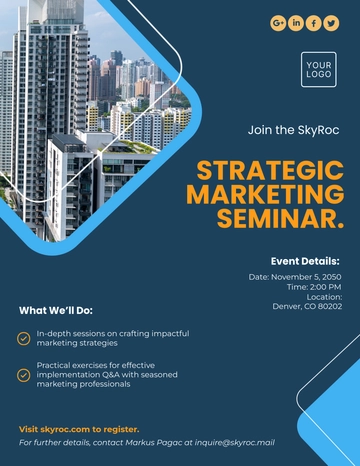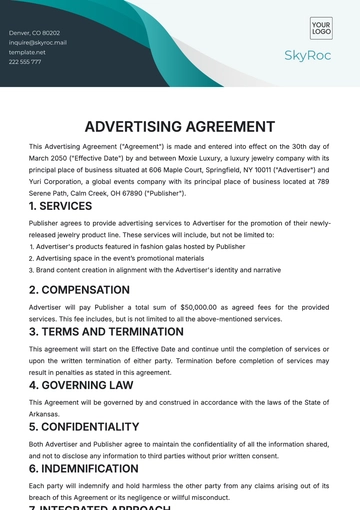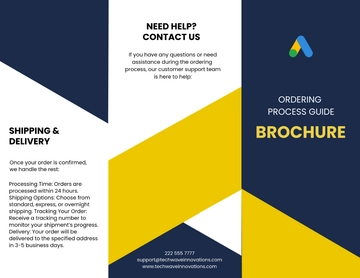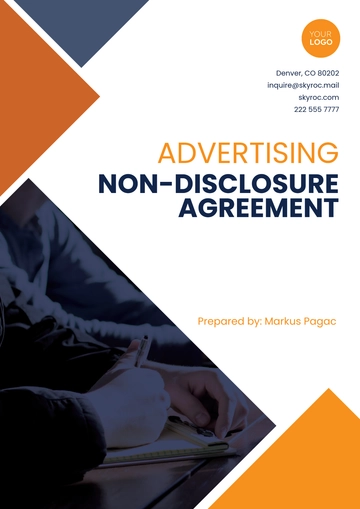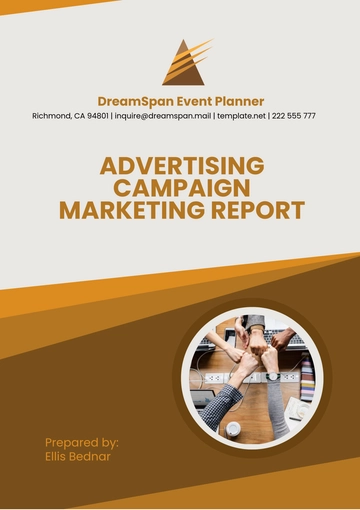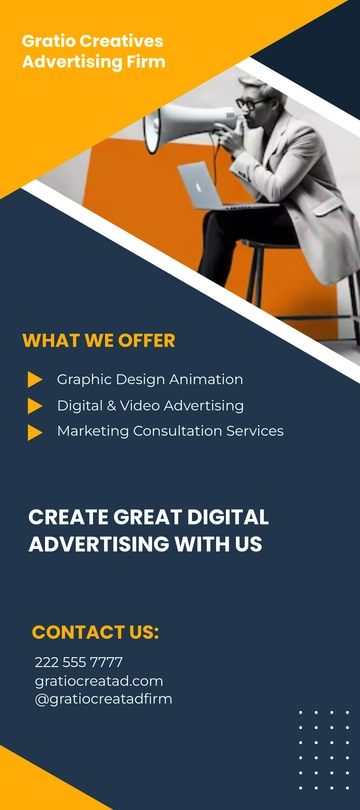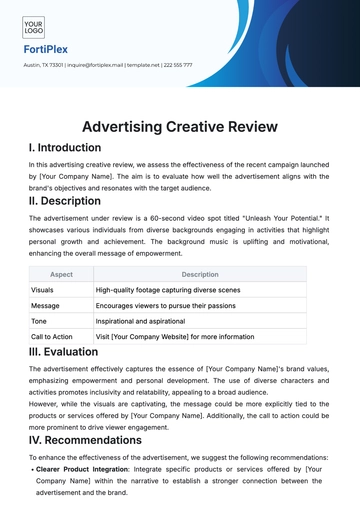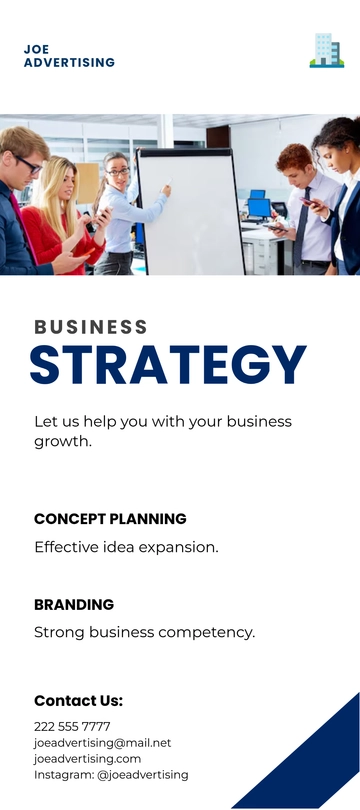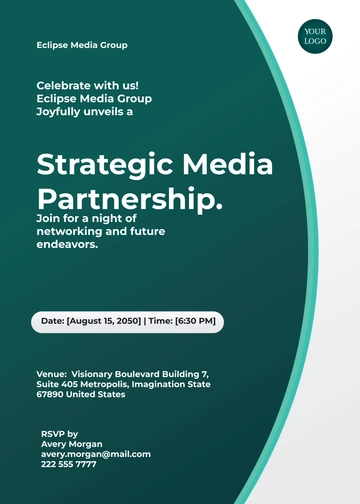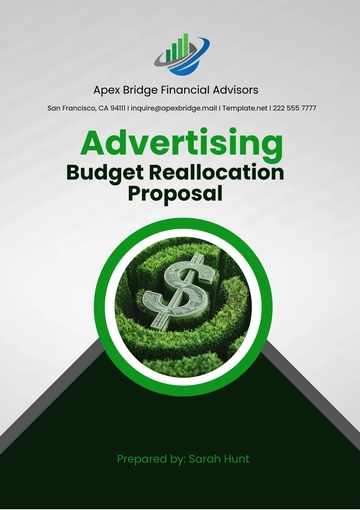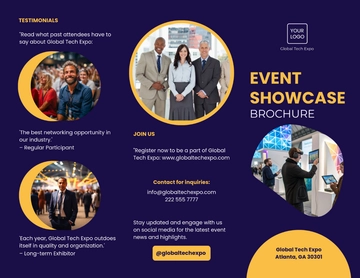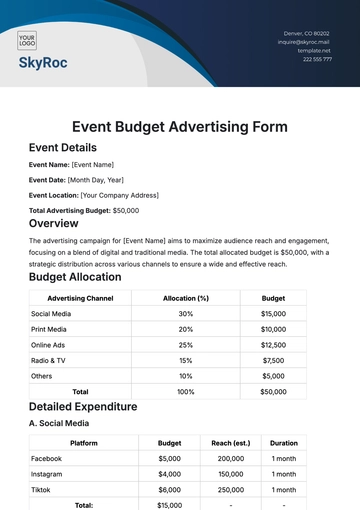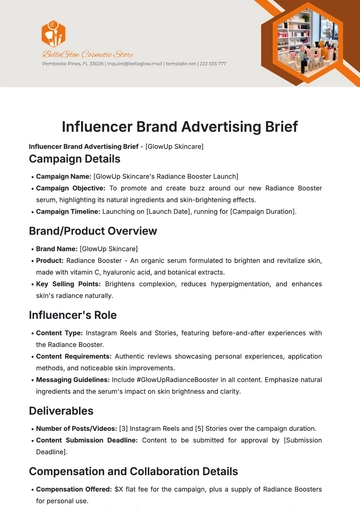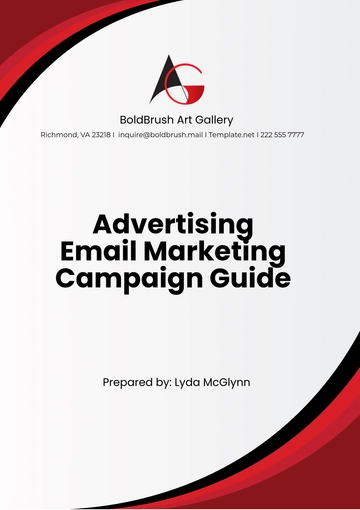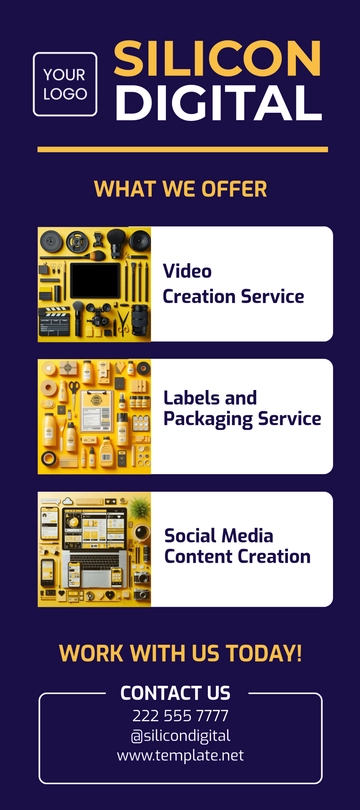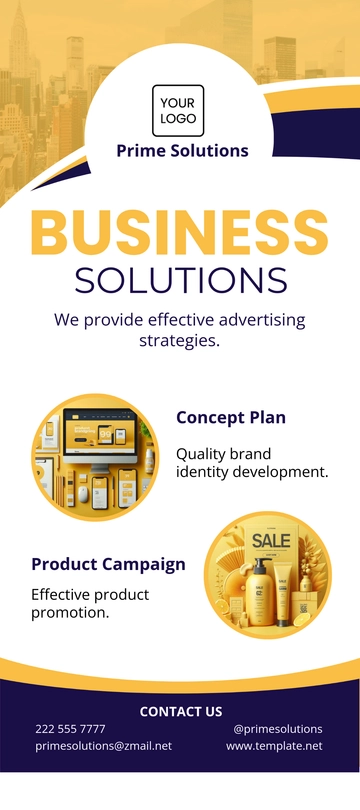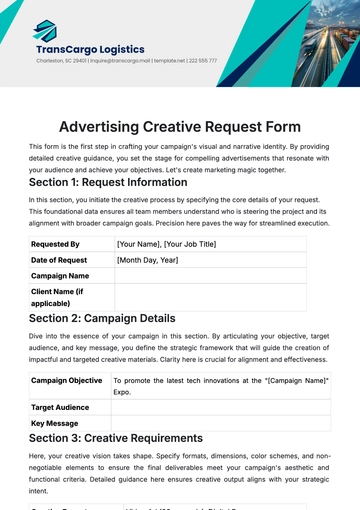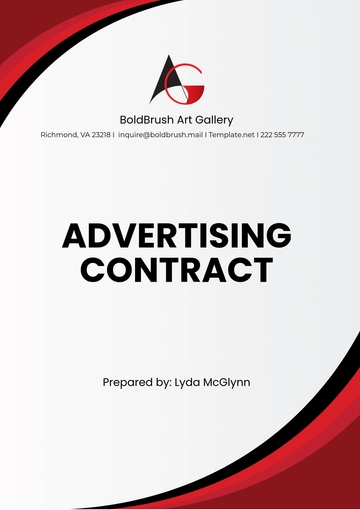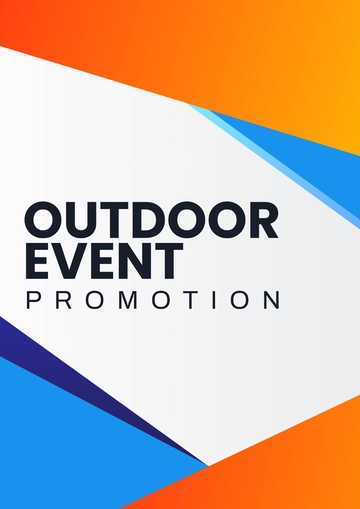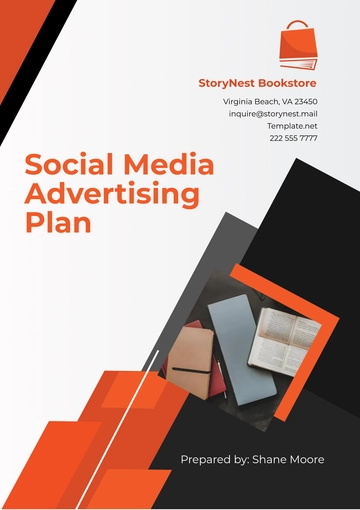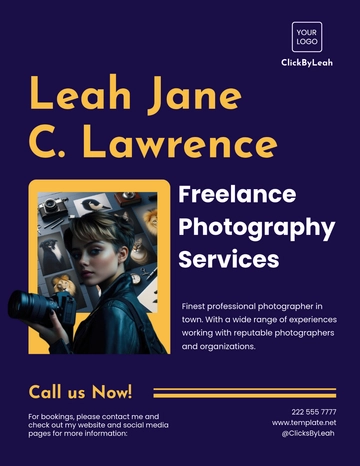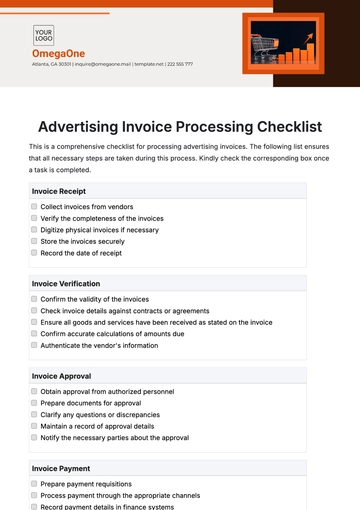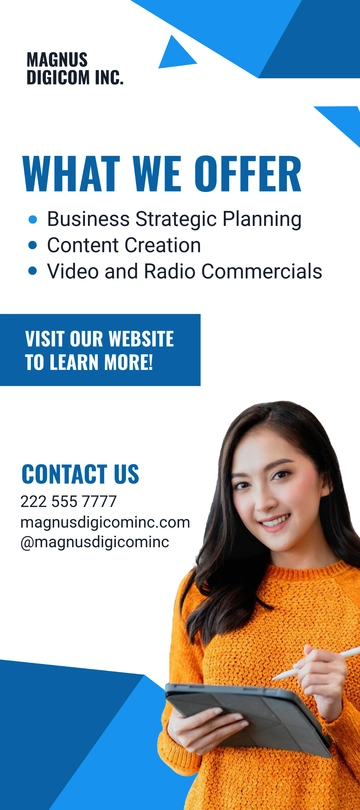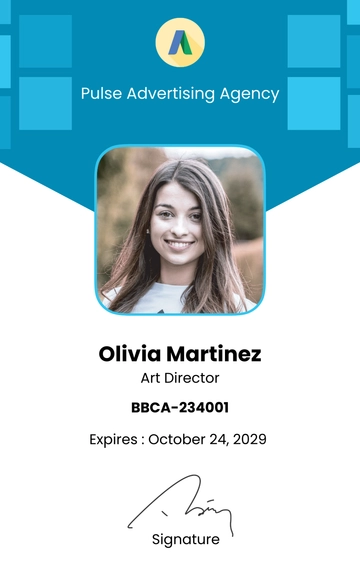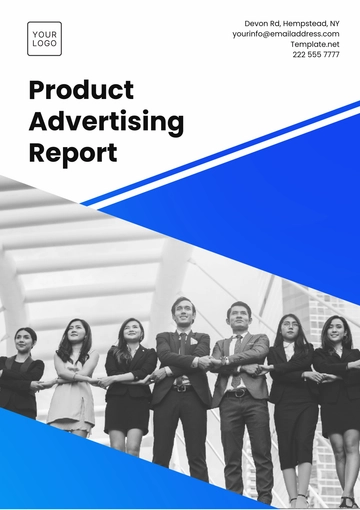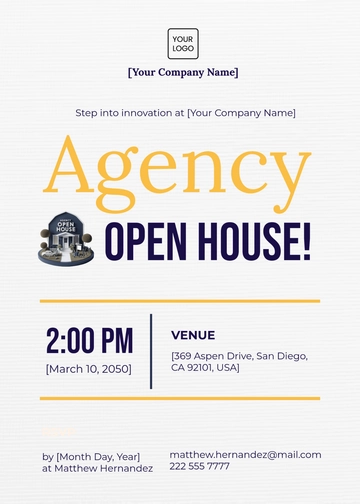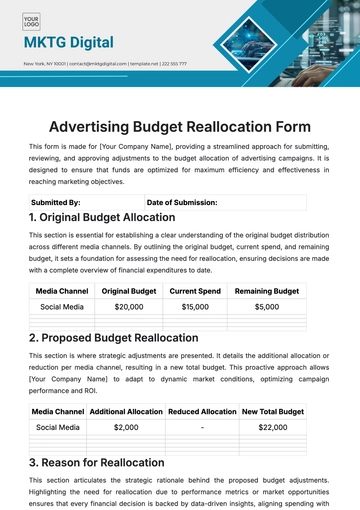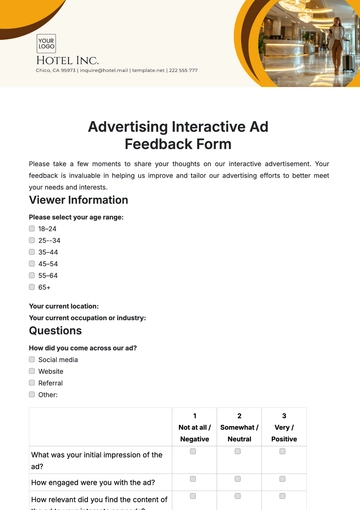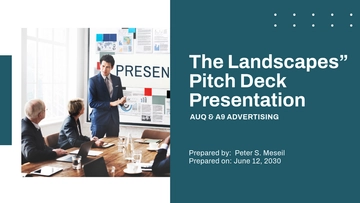Free Executive Interview Preparation Advertising Document
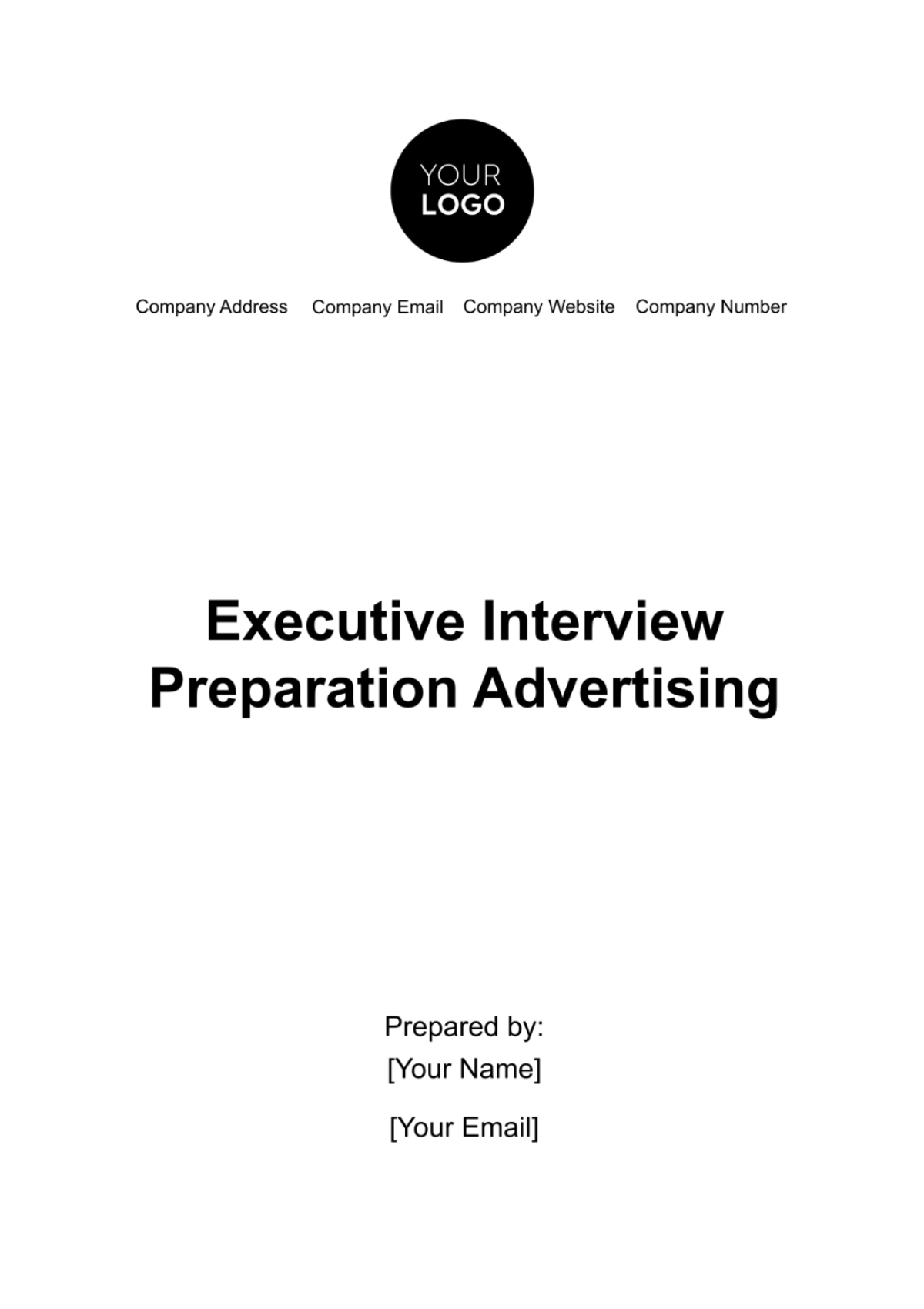
Introduction
The purpose of this document is to offer a guide for the candidates preparing for an executive-level interview at [Your Company Name]. Given the competitive and dynamic nature of the advertising industry, this guide focuses on key aspects that are crucial for prospective executives.
Company Overview
This overview is made to equip candidates with a deep understanding of the company's place in the industry. Understanding these elements is crucial for aligning one’s leadership approach and vision with the company's trajectory.
Company Name: | [Your Company Name] |
Year Established: | [2050] |
Industry: | Advertising |
Mission: | To innovate in advertising through creativity, data-driven strategies, and cutting-edge technology |
Vision: | To be the global leader in advertising by driving brand success and customer engagement. |
Highlighting Leadership and Innovation
[Your Company Name] demands a unique blend of leadership and innovative thinking. This section delves into how candidates can effectively showcase these crucial qualities during their interviews, aligning them with the company's ethos and strategic objectives.
1. Demonstrating Effective Leadership: Explore the company's leadership philosophy, focusing on how it integrates with the company's values and business strategies.
a. Adaptive Leadership Styles: Discuss different leadership styles and how they can be adapted to suit various team dynamics and project requirements within the company.
b. Personal Leadership Experiences: Prepare to share real-life examples where your leadership made a tangible impact, particularly in challenging situations or during significant transformations.
c. Vision-Driven Leadership: Illustrate how your leadership approach can align with and drive the company's vision and long-term objectives.
2. Fostering a Culture of Innovation: Identify the key drivers of innovation, such as technology advancements, creative thinking, or market trends.
a. Successful Innovations: Analyze past successful innovations by the company and how they have shaped the advertising landscape.
b. Innovative Solutions and Strategies: Prepare examples from your career where you have implemented innovative solutions or strategies that led to successful outcomes.
3. Integrating Leadership and Innovation: Discuss how leadership and innovation intersect in your professional experience, emphasizing your ability to lead teams in exploring new ideas and approaches.
a. Strategic Innovation Implementation: Highlight instances where your leadership has directly facilitated the implementation of innovative strategies, contributing to business growth and market leadership.
By effectively highlighting these aspects, candidates can demonstrate their readiness to contribute significantly to the company's future successes. This section aims to assist candidates in presenting a compelling narrative that blends well with their leadership prowess and innovative mindset.
Understanding the Company's Clientele and Market Impact
An understanding of the company's clientele and its impact on the market is essential for any executive role. This section offers a guide on how to grasp and articulate the nuances of the company's client base and market influence, showcasing your preparedness to contribute meaningfully in an executive capacity.
1. In-Depth Client Segmentation
a. Sector-Specific Analysis: Deepen your understanding of the company's client segments across various industries. Assess how the company tailors its advertising strategies to meet the unique needs of each sector.
b. Demographic and Geographic Diversification: Evaluate the demographic range and geographic spread of the client base, understanding how the company adapts its approach to cater to diverse markets.
2. Client Success Stories
a. Strategic Insights from Campaigns: Examine the strategic thinking and creative processes behind successful campaigns, understanding their alignment with client objectives and brand messages.
b. Perception and Value: Analyze testimonials to understand clients' perceptions of the company's value proposition and service quality.
c. Feedback Integration: Explore how client feedback has been integrated into the company's service offerings and operational improvements.
3. Market Reach and Reception Analysis
a. Campaign Influence and Reach: Investigate the breadth and depth of the market reach achieved by major campaigns. Consider factors like audience engagement, brand awareness, and market penetration.
b. Branding and Positioning Impact: Evaluate the impact of these campaigns on client branding and market positioning, assessing both short-term and long-term effects.
c. Trend Analysis: Examine how the company has either set new trends or adeptly followed emerging trends in advertising. Consider the impact of these trends on the industry as a whole.
d. Case Studies of Trendsetting: Identify specific campaigns or initiatives where the company has been a trendsetter, influencing industry standards and practices.
e. Innovative Technologies and Approaches: Assess the company's use of cutting-edge technologies and creative approaches, and how these have positioned the company as a leader in the field.
f. Future-Oriented Strategies: Explore the company's strategies for staying ahead in innovation, including investments in research and development, and partnerships with tech companies.
4. Adapting to Client Needs and Market Changes
a. Agility in Strategy Development: Discuss how the company demonstrates agility in adapting strategies to evolving client needs and market trends.
b. Client-Centric Approach: Explore examples of how the company has modified or customized its approach to meet specific client requirements or address market shifts.
c. Anticipating Market Movements: Analyze how the company anticipates market movements and adapts its positioning accordingly.
d. Strategic Foresight Examples: Present case studies or scenarios where proactive positioning has given the company a competitive edge.
5. Sustainable Client Relationship Strategies
a. Longevity Tactics: Delve into the tactics and strategies employed by [Your Company Name] to nurture and sustain long-term client relationships.
b. Client Loyalty and Retention: Assess the company's approach to client loyalty and retention, including the use of client feedback and satisfaction surveys.
c. Diversification Impact: Assess the impact of diversification efforts on the company's overall market standing and client portfolio.
It’s imperative to acknowledge the company's clientele and market impact plays in shaping strategic decisions at an executive level. This segment equips candidates with the knowledge and insights to effectively discuss [Your Company Name]'s market positioning and client dynamics, demonstrating their preparedness to drive the company's future success in the advertising industry.
Cultural Fit and Adaptability
For executive roles, aligning with the company’s culture and demonstrating adaptability are as crucial as professional skills and experience. This segment offers a detailed approach for candidates to understand, assess, and articulate their alignment with the company's culture, and their ability to adapt to and thrive in our dynamic environment.
1. Deep Dive into Company Culture
a. Core Cultural Values: Explore the core values that define [Your Company Name]'s culture. Understand how these values manifest in day-to-day operations and decision-making processes.
b. Work Environment and Employee Engagement: Get insights into the work environment, team dynamics, and employee engagement initiatives. This includes understanding the company's approach to work-life balance, diversity and inclusion, and employee development programs.
c. Reflection and Alignment: Encourage self-reflection to identify how your personal values and work style align with the company's culture.
d. Articulating Cultural Fit: Prepare to articulate this alignment in the interview, providing specific examples or scenarios where your values and approach mirrored those of the company.
2. Demonstrating Adaptability
a. Industry Evolution and Adaptation: Understand how the company has adapted to changes in the advertising industry, including shifts in technology, consumer behavior, and market trends.
b. Personal Adaptability Examples: Reflect on instances where you have successfully adapted to significant changes or challenges in your career. Prepare to discuss these examples, highlighting your flexibility, resilience, and innovative problem-solving skills.
c. Change Management: Discuss your experience with managing and leading change, whether in processes, technology, or organizational structure.
d. Proactive Adaptation: Showcase your ability to anticipate and proactively respond to industry and organizational changes, positioning yourself as a forward-thinking leader.
3. Integrating Cultural Fit and Adaptability in Leadership
a. Harmonizing with Culture While Driving Change: Illustrate how you can maintain alignment with the company’s culture while being an agent of change, striking a balance between fitting in and leading evolution.
b. Leadership in Diverse Settings: Provide examples of your leadership in diverse cultural settings, demonstrating your capability to understand, respect, and leverage different perspectives and backgrounds.
It is emphasized that a deep understanding of [Your Company Name]'s culture is vital for success in an executive role. This guide is designed to help candidates showcase their cultural synergy and adaptability, reinforcing their potential as a valuable addition to the leadership team.
Interview Preparation
This section aims to equip candidates with the necessary tools and insights to demonstrate their compatibility with the company's culture, strategic goals, and the specific competencies required for leadership roles in the advertising industry.
Understanding [Your Company Name]'s Culture: Delve into the company's history, achievements, and future aspirations. Review annual reports, media releases, and recent campaigns to gain a holistic view. Study prominent advertising campaigns led by the company to understand their approach to innovation and client engagement.
Strategic Insight: Thoroughly analyze the job description to understand the required skills, experiences, and qualifications. Map out your skills and experiences to the role, preparing detailed examples that demonstrate your suitability.
Role-Specific Competencies: Prepare to articulate how your experience can contribute to the strategic goals of the company. Be ready to discuss trends in the advertising industry and how they might impact the company's future strategies.
Behavioral Interview Questions: Anticipate common behavioral questions related to leadership, decision-making, and conflict resolution. Practice responses using the STAR (Situation, Task, Action, Result) technique. Prepare for hypothetical scenarios that may arise in the advertising industry, demonstrating your problem-solving and innovative thinking skills.
Company-Specific Scenarios: Develop a narrative that showcases your career journey, achievements, and how they align with our ethos. Ensure your personal brand resonates with the company's values and mission. This includes your online presence, communication style, and professional attire.
Mock Interviews and Feedback: Engage in mock interviews with peers or mentors to simulate the interview environment. Actively seek and incorporate feedback to refine your approach and answers.
Interview Schedule
This schedule provides an overview of the activities the candidates must follow on the interview day. This will allow our candidates to prepare mentally and logistically for each phase of the process.
Time | Activity |
9:00 AM | Arrival and Welcome |
Company Overview Presentation | |
Interview with the CEO | |
Panel Interview with Senior Executives | |
Lunch with Team Members | |
Presentation on Strategic Vision | |
Discussion with HR on Company Culture and Values | |
Wrap-Up and Next Steps |
Conclusion
The ultimate goal of this guide is to help you to present the best version of your professional self. It is about showcasing qualifications and potential to contribute meaningfully to [Your Company Name]'s future. Your preparation should be a blend of personal reflection and deep understanding of the company's culture and goals.
We extend our best wishes to you in this endeavor. With the right preparation, a keen understanding of [Your Company Name], and a clear demonstration of your alignment with the company's vision and values, you are well-positioned to succeed. Good luck, and we look forward to possibly welcoming you to our team!
- 100% Customizable, free editor
- Access 1 Million+ Templates, photo’s & graphics
- Download or share as a template
- Click and replace photos, graphics, text, backgrounds
- Resize, crop, AI write & more
- Access advanced editor
Elevate your executive interview game with Template.net's Executive Interview Preparation Advertising Document Template. Crafted to perfection, this editable and customizable template puts you in control of your preparation journey. Utilize our Ai Editor Tool to tailor your pitch, ensuring you stand out in every interview scenario. Optimize your chances of success with Template.net's cutting-edge solutions.
